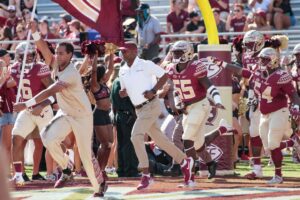
There is a large demographic of African-American players in college football, but not a lot of African-American coaches. According to the NCAA’s demographics database, in 2018, of the 29,029 college football players in Division I football, 14,069 were African-American while 10,830 players were Caucasian.
But there aren’t many African-American head coaches, especially in the more popular Football Bowl Subdivision. In the FBS there are only 11 African-American head coaches. Florida State is an FBS school and at the helm of the program is Coach Willie Taggart.
Taggart took the coaching job after Jimbo Fisher took a $75 million deal at Texas A&M University. He is the second African-American head coach after Odell Haggins was named the interim head coach for the last two games in the 2017 season.
Emmett Rice is a junior linebacker who has played under both Fisher and Taggart.
“The main differences between the coaches is that Jimbo Fisher is more of a stricter coach, like strictly business and Coach Taggart is more of a player’s coach,” said Rice.
By being a player’s coach, Taggart has instilled in his players lessons that can be applied on and off the field. Including the four battles a young man must face every day, which has supplemented the growth of his players.
In the Football Championship Subdivision, there are 26 head coaches who are African-American, the majority of these coaches are at historically black colleges or universities.
At Florida A&M University, African-American coaches leading the team has been the norm with legends like Jake Gaither at the head of the program.
Last year, the school hired Quincy’s very own Willie Simmons and he has led the Rattlers to their first winning season since 2011. The Rattlers were only one win away from competing in the Celebration Bowl, also known as the Black College Championship. Off the field, he has helped his players grow and become young men.
“He taught us something that really stuck with me, you’re in control of your own destiny. Whatever you want to do, you can do it you just have to live up to it,” said Chad Hunter, a junior wide receiver.
When people in powerful positions look like you and come from where you come from, you’re looking at a reflection of what you can be. The harsh reality is that only 9 percent of head coaches in the FBS are African-American. But by seeing their importance and what they contribute to players with similar upbringings and life experiences, they are a necessity to the sport and the players.